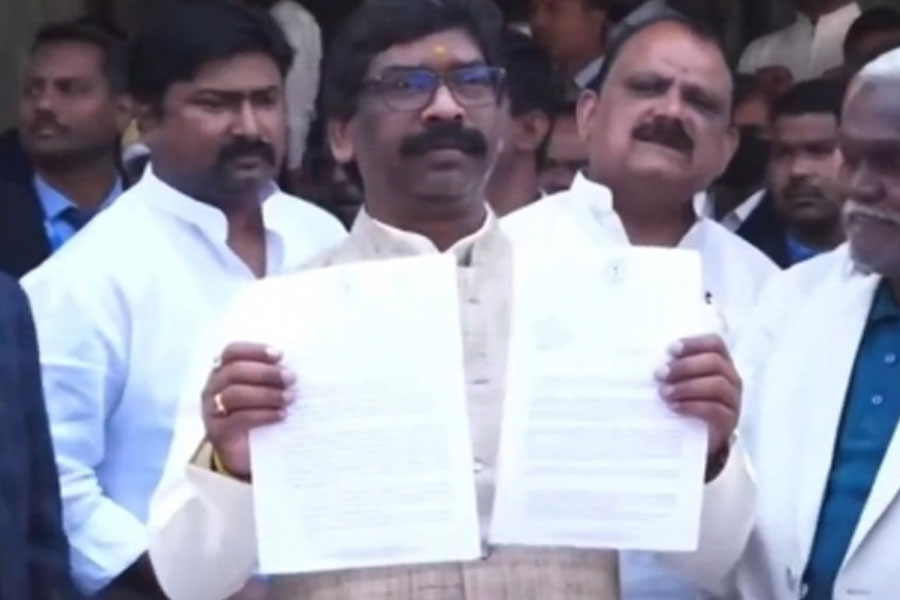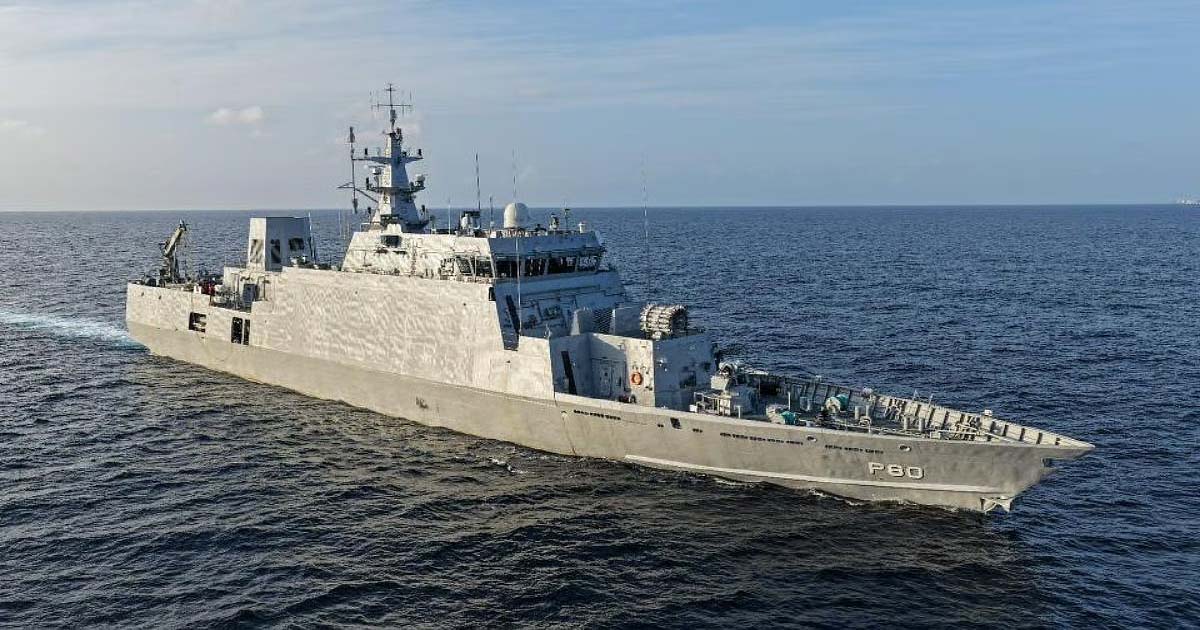National News
ED grills Jharkhand CM for over 9 hrs in ‘illegal’ mining case

The Enforcement Directorate (ED) questioned Jharkhand Chief Minister Hemant Soren for over nine hours on Thursday in connection with an alleged illegal stone mining case.
On ED’s summons, the Chief Minister had reached the ED’s zonal office in Ranchi at 12:05 p.m., from where he left at 9.35 p.m.
His wife Kalpana Soren reached the ED office to pick him up after the questioning.
According to sources, a team of three ED officials asked him about 100 questions on Thursday, and the Chief Minister can be again called for further questioning.
Hemant Soren’s chequebooks, which had two signed cheques, were found in a raid at the house of his special representative Pankaj Mishra, already arrested in the case.
Hemant Soren, during the questioning, was asked why he had given the chequebooks to Mishra.
According to sources, the Chief Minister told the officials that while being in politics, many times needy people are required to be helped financially. The chequebook was with his representative for the same purpose.
He was also asked whether he was aware of an alleged illegal mining racket running under the “patronage” of Mishra. The Central agency sought the Chief Minister’s response to “whether any complaint about this (racket) reached to him or not and if it did, did he take any action or not”.
Hemant Soren was also questioned about his relationship with power broker Prem Prakash and businessman Amit Agarwal, arrested in Rs 1,000 crore money laundering case linked with the alleged mining scam.
On the basis of the evidence collected by the ED during its raids, several details were sought from the Chief Minister.
Sources said that Hemant Soren did not respond to several of the ED’s questions.
Earlier in the day, while addressing a press conference ahead of appearing before the ED, Hemant Soren claimed that the allegations levelled against him are baseless.
He also questioned the ED’s statement on a scam of Rs 1,000 crore taking place in one district (of the state), saying that the “entire state does not earn this amount of money from stone chips in a whole year”.
He attacked Governor Ramesh Bais, accusing the latter of protecting the parties engaged in conspiratorial politics and showed his disapproval about Bais’ statement regarding his pending decision on the political crisis in the state.
Soren claimed that the ED summon and raids by the Income Tax department and other Central agencies on the premises of the ruling party’s MLAs started soon after Bais’ statement.
National News
Maharashtra Politics: Shiv Sena (UBT) Accuses BJP Of Engineering ‘Unopposed Election Scam’, Using Commissioner As ‘Puppeteer’

Shiv Sena Uddhav Balasaheb Thackeray (UBT) on Monday accused the ruling Bharatiya Janata Party (BJP) of orchestrating a large-scale “unopposed election scam” in Maharashtra’s local body polls, using “puppeteers” like Chief Election Commissioner Gyanesh Kumar as a metaphor for those working behind the scenes to fix outcomes.
It claims that a web of uncontested victories, first alleged in the context of Delhi and Bihar, is now being replicated across districts and talukas in Maharashtra, raising questions about the state of democracy and the Constitution. In a scathing editorial in party mouthpiece Saamana, the Thackeray camp claimed repeated reliance on threats, money and administrative misuse to engineer unopposed wins, shows a fear of genuine electoral competition that is causing the “visible collapse” of all pillars of democracy.
“If such trends continue in a politically significant state like Maharashtra, the moral authority of the Constitution and the credibility of elections will be gravely damaged, even as the BJP publicly projects the local body polls as a prestige battle to demonstrate its dominance,” it warns.
The editorial accuses the BJP of systematically ensuring that relatives of party leaders are elected unopposed to municipal corporations, Nagar Parishads and Nagar Panchayats by forcing Opposition candidates to withdraw through threats, pressure and inducements.
It cites alleged instances in Jamner, Daund and a Nagar Parishad in Solapur district, where public anger reportedly spilled over into violence, and claims that in places like Chikhaldara and Daund, family members of Chief Minister Devendra Fadnavis and minister Jaykumar Rawal have secured posts without facing a contest, mirroring wider Opposition complaints that BJP-linked relatives are winning unopposed in the ongoing local body elections.
According to the editorial, this pattern is part of a broader “money-and-power-driven” strategy in which BJP leaders openly boast of having “bags of money” to fight elections and allegedly signal that government control will take care of expenses, while the election authorities remain passive.
“From Gram Panchayats to housing societies and cooperative banks, BJP is trying to entrench dominance by deploying financial clout and manipulating institutions, turning itself into an ‘election-obsessed’ organisation more focussed on securing and managing victories than respecting democratic norms. Key decisions on whose nomination forms to accept or reject, and who should be left unopposed, are effectively taken before formal scrutiny, with money purportedly changing hands even in uncontested seats for officials and local intermediaries,” says the editorial.
Drawing a link to its earlier criticism of the Bihar Assembly election outcome as a “scam” driven by a pre-decided formula, it suggests that a similar playbook is now being used in Maharashtra’s civic polls through what it calls “Gyanesh Kumar-type operators” embedded in the system.
National News
Kalyan Student Suicide Case Update: No Leads Found, Lacks Eyewitness Due To ‘Peak-Hour Crowding’

Mumbai: In the Kalyan student suicide case, the Thane police have intensified the probe and questioned about 10 commuters who were in the same coach of the Mumbai local train; however, no leads have been currently found in the case. The 19-year-old, Arnav Khaire, was allegedly assaulted and threatened by fellow passengers on a Mumbai local train following a Hindi-Marathi language-based argument. Arnav went into severe mental stress, emotional breakdown and later died by suicide at his residence.
When the police questioned the commuters of the same coach of the CSMT-Ambernath train, many claimed that they did not come across any conflict or assault, ‘citing peak-hour crowding.’ In addition to this, the police sources told Media that the CCTV footage was also examined with the help of Kalyan Government Railway Police (GRP) to trace multiple passengers who boarded the local train from Ambernath to Thane. Senior inspector Hemant Gurav of Kolsewadi police station told the daily, “We are still trying to identify other passengers in the coach.”
Apart from speaking to commuters, the report added that the police also sent the victim’s mobile phone to forensic lab to retrieve messages, voice recordings, videos, or calls he made before his death.
Earlier on November 22, the Kolsewadi Police registered a case of abetment to suicide against the unknown individuals who assaulted Arnav inside a local train. The FIR clearly stated that the attack played a crucial role in pushing Arnav towards suicide.
On November 22, Maharashtra Deputy Chief Minister Eknath Shinde spoke with Arnav’s family and assured the family of full government support, immediate investigation, and justice. In addition to this, the Deputy CM assured that until the linguistic extremists responsible for Arnav’s suicide are punished, “we will not remain silent.”
National News
INS Mahe Commissioned In Mumbai: Indian Navy Inducts 1st Anti-Submarine Warfare Vessel; All You Need To Know

Mumbai: A major boost to India’s coastal defence capability came on Monday as the Indian Navy commissioned INS Mahe, the first vessel in the Mahe-class series of Anti-Submarine Warfare Shallow Water Craft (ASW-SWC). The ceremony, held at the Naval Dockyard in Mumbai, was hosted by Vice Admiral Krishna Swaminathan, Flag Officer Commanding-in-Chief, Western Naval Command and presided over by Army Chief General Upendra Dwivedi.
The commissioning marks the arrival of a new generation of indigenous shallow-water combatants, compact, highly manoeuvrable and designed specifically for India’s littoral warfare requirements. Built by Cochin Shipyard Limited (CSL), INS Mahe reflects the strength of the Aatmanirbhar Bharat initiative, with over 80 per cent indigenous content in its design, construction and integration. Navy officials described the vessel as ‘sleek, swift and resolutely Indian.’
INS Mahe’s primary role is anti-submarine warfare in shallow waters, an area where conventional deep-water ships face limitations. With a blend of stealth, firepower and agility, the ship will undertake submarine hunting, coastal patrol and surveillance duties, strengthening security along critical maritime approaches.
Its name pays tribute to Mahe, the historic coastal enclave on India’s Malabar Coast. The ship’s crest features the Urumi, the flexible sword of Kalaripayattu, symbolising agility, precision and lethal grace, qualities reflected in the vessel’s mission profile.
Navy officials emphasised that INS Mahe is a multi-purpose warship, capable of being deployed across a wide spectrum of operations:
Anti-submarine warfare
Coastal defence and maritime security
Underwater surveillance
Search and rescue
Mine-laying
High-precision missions in shallow waters
Its compact 78-metre frame, 2.7-metre draft, 896–1,100-ton displacement and robust water-jet propulsion enable rapid manoeuvring even in tight maritime zones, an increasingly crucial requirement in modern coastal defence.
INS Mahe is powered by a modern diesel-engine and water-jet propulsion system, allowing a top speed of 25 knots and a range of 1,800 nautical miles at cruising speed. It carries 57 crew members including seven officers and is equipped with two RHIBs for rapid response.
With an extremely low acoustic signature, the vessel is engineered to remain undetected while tracking enemy submarines. This stealth advantage is reinforced by advanced sonar systems, making it highly effective in both shallow and variable-depth waters.
The ship’s surveillance backbone is built around two state-of-the-art sonar systems:
1. DRDO Abhay Hull-Mounted Sonar
Continuously monitors underwater surroundings
Detects submarine signatures, mines and artificial objects
Optimised for shallow-water operations
2. Low Frequency Variable Depth Sonar (LFVDS)
Deployed through a cable for deep-water detection
Effective in areas where hull-mounted sonar faces limitations
Long-range, low-frequency scanning for high accuracy
Together, the systems offer round-the-clock underwater surveillance and precise target identification.
INS Mahe is armed with a range of modern weapons, making it a formidable platform for anti-submarine warfare:
12-barrel IRL Anti-Submarine Rocket Launcher
30 mm Naval Surface Gun for defence against small craft and aerial threats
Two triple lightweight torpedo launchers (six ALWT torpedoes)
Anti-submarine mines deployable via mine-laying rails
Two 12.7 mm Stabilised Remote-Controlled Guns for coastal and anti-piracy operations
The combination enables detection, tracking and elimination of hostile submarines and maritime threats across a variety of operational scenarios.
With INS Mahe joining the fleet, the Indian Navy majorly enhances its littoral warfare capability. The vessel will play a vital role in protecting India’s coastal zones, monitoring suspicious submarine activity and contributing to mission-critical operations on the Western Seaboard.
INS Mahe stands as both a strategic asset and a milestone in India’s indigenous defence manufacturing journey, further strengthening maritime security and pushing India closer to naval self-reliance.
-

 Crime3 years ago
Crime3 years agoClass 10 student jumps to death in Jaipur
-

 Maharashtra1 year ago
Maharashtra1 year agoMumbai Local Train Update: Central Railway’s New Timetable Comes Into Effect; Check Full List Of Revised Timings & Stations
-

 Maharashtra1 year ago
Maharashtra1 year agoMumbai To Go Toll-Free Tonight! Maharashtra Govt Announces Complete Toll Waiver For Light Motor Vehicles At All 5 Entry Points Of City
-

 Maharashtra1 year ago
Maharashtra1 year agoFalse photo of Imtiaz Jaleel’s rally, exposing the fooling conspiracy
-

 National News1 year ago
National News1 year agoMinistry of Railways rolls out Special Drive 4.0 with focus on digitisation, cleanliness, inclusiveness and grievance redressal
-

 Maharashtra1 year ago
Maharashtra1 year agoMaharashtra Elections 2024: Mumbai Metro & BEST Services Extended Till Midnight On Voting Day
-

 National News1 year ago
National News1 year agoJ&K: 4 Jawans Killed, 28 Injured After Bus Carrying BSF Personnel For Poll Duty Falls Into Gorge In Budgam; Terrifying Visuals Surface
-

 Crime1 year ago
Crime1 year agoBaba Siddique Murder: Mumbai Police Unable To Get Lawrence Bishnoi Custody Due To Home Ministry Order, Says Report












